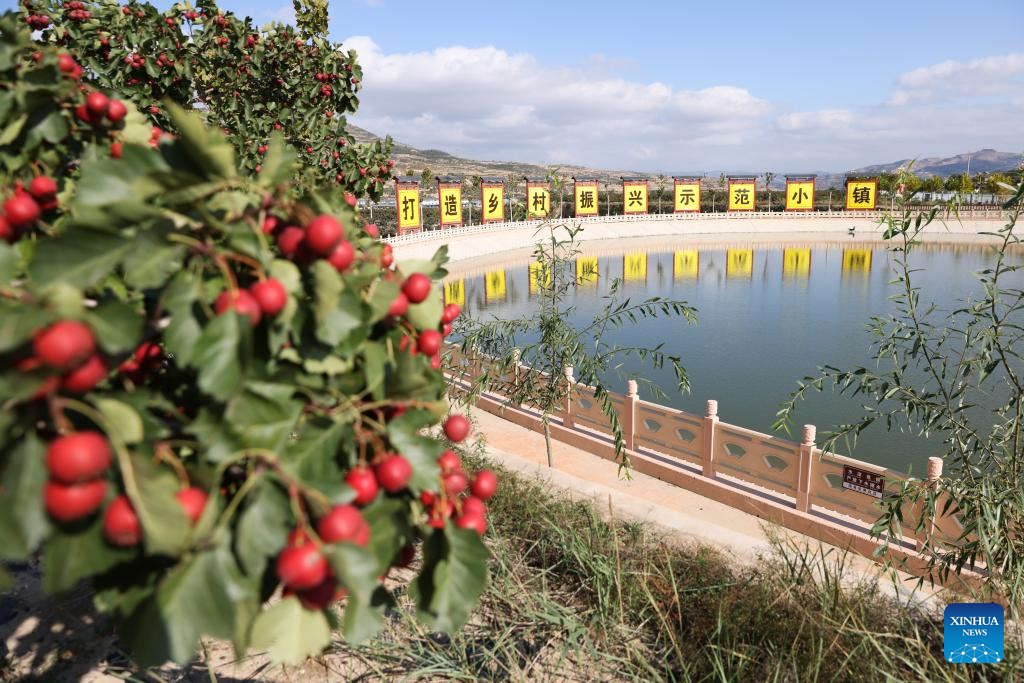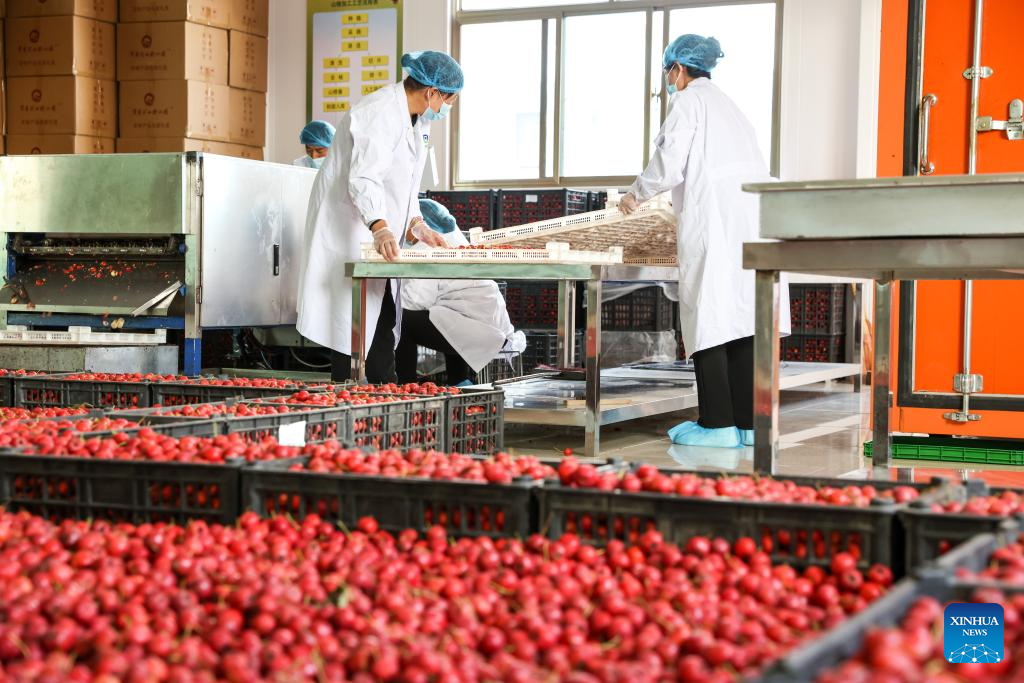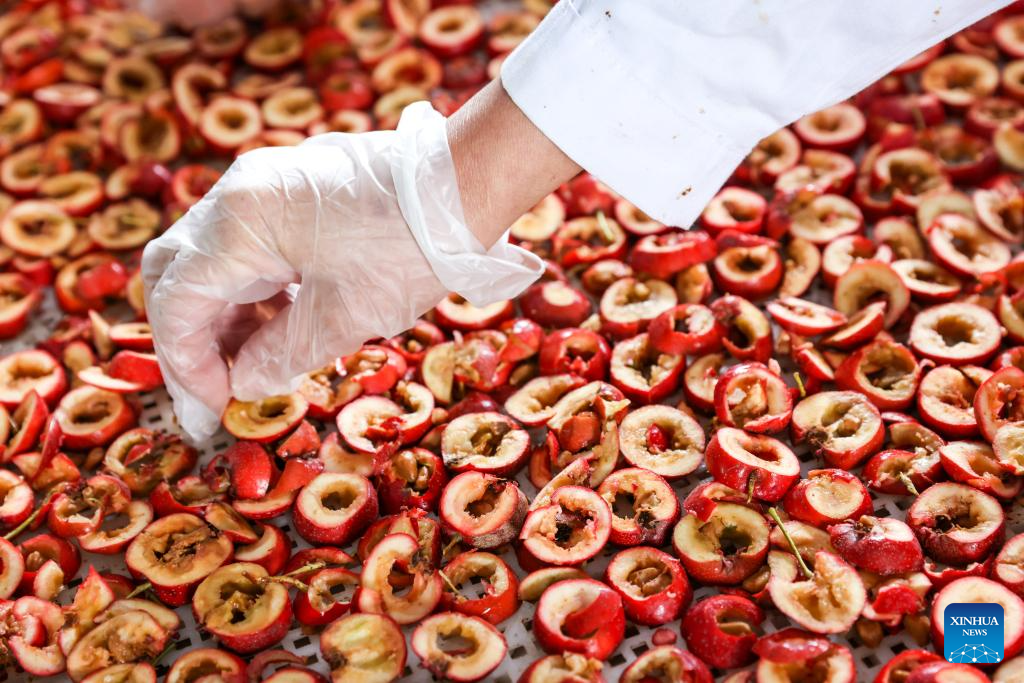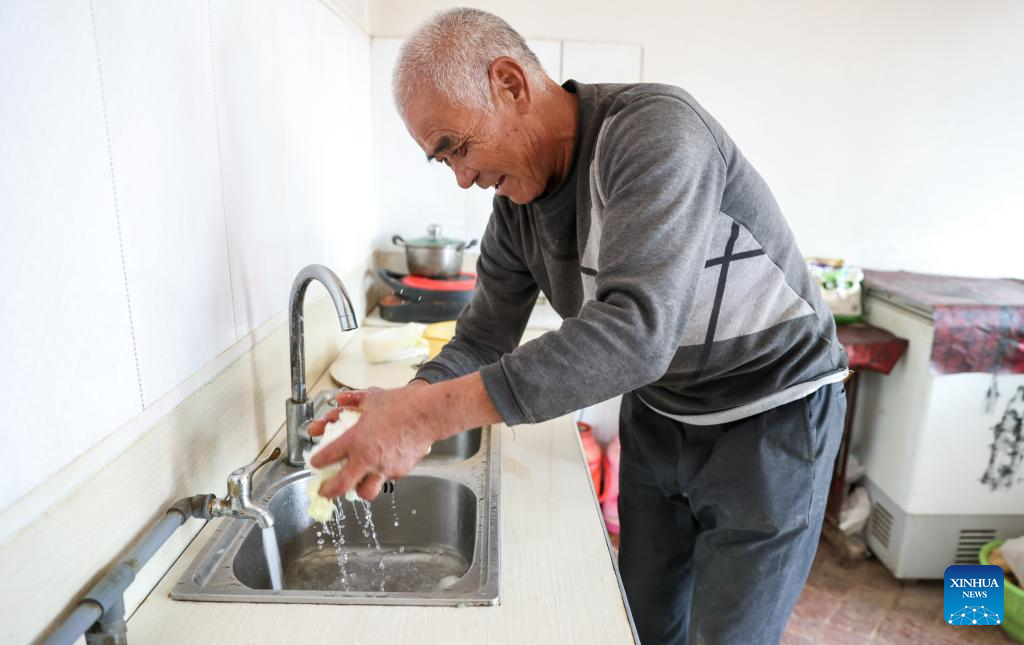
This photo taken on Oct. 14, 2024 shows a view of Hawthorn Town, an agricultural park and tourism resort, in Changjiahe Town of Dingxi City, northwest China's Gansu Province. (Xinhua/Lyu Shuai)
LANZHOU, Oct. 18 (Xinhua) -- Dong Yinhua, 67, loves brewing tea, indulging in its refreshing taste and aroma.
"During my youth, let alone sipping tea, I could only drink a limited amount of 'bitter' water. Now I really enjoy sipping tea brewed from clean water and savoring the sweetness of life," said Dong, a villager in Pinghe Village of Tongwei County on the Loess Plateau in northwest China's Gansu Province.
Pinghe is run through by Kushui River, which means river of bitter water in Chinese. It was the major water source for locals in the past.
The county's average annual precipitation is about 380 mm, while its average yearly evaporation reaches 1,500 mm, with its per capita water resources about 10 percent of the national average. Water deficiency led to harsh living conditions and entrenched poverty for Tongwei people.
Villagers of Pinghe had to climb mountains to fetch water from springs with less sediment. Water had to be settled for over half a day for filtration.
"The water quality was extremely poor. After we swallowed it, the bitter and salty tastes lingered on the tongue," recalled Dong.
"We often queued for half a day. In winter when paths were frozen, I sometimes slipped, and then water coming out of the buckets would wet my pants. Then I had to queue again," said Dong. "After school, children picked up buckets and queued up to fetch water, rather than doing their homework first."
In 1977, villagers began building water storage wells. However, these wells did not access groundwater due to aridity; they were used for gathering rainfall and preventing evaporation.
Starting in 1995, pipes were connected to the roofs of residential houses in Pinghe and two water storage wells were built for every household under the support and finance of the Gansu government, aiming to solve the drinking water difficulties for people and animals. Nevertheless, water was still in shortage.
Thanks to a water diversion project, which diverts water from the Taohe River, a major tributary of the Yellow River, to regions facing water shortage in the central part of Gansu.
The project was initiated in 1958, but was suspended shortly due to insufficient technology and funds. It was relaunched in 2006 and two phases had been completed by 2021.
Since the first phase went into operation in 2014, the project has diverted over 1 billion cubic meters of water, benefiting nearly 6 million people, according to the water resources department of Gansu.
After water pipes were set up, households in Pinghe initially accessed tap water in 2015. Currently, all villages and nearly all households in Tongwei have access to tap water.
"In the past, I took a shower only several times a year, but now I can almost take a shower every day," said Dong, who has built a shower room in his house.
Abundant water has also boosted agricultural development and business.
In Hawthorn Town, an agricultural park and tourism resort in Tongwei, water facilities including a reservoir were built to divert water from the Taohe River. Locals are employed to pick hawthorns during the current harvest season and tourists can experience picking and farm life.
According to Chang Haizeng, head of the resort's operating company, the resort has helped raise the incomes of over 1,300 households from four nearby villages.
Zhang Yunxuan has worked for the town for over five years doing farm work. "I can earn about 4,000 yuan (about 562 U.S. dollars) a month," said the 53-year-old villager. "I can work at the doorstep and meanwhile take care of my family." ■

Staff members process hawthorns at a workshop in Hawthorn Town, an agricultural park and tourism resort, in Changjiahe Town of Dingxi City, northwest China's Gansu Province, Oct. 14, 2024. (Xinhua/Lyu Shuai)

A staff member processes hawthorns at a workshop in Hawthorn Town, an agricultural park and tourism resort, in Changjiahe Town of Dingxi City, northwest China's Gansu Province, Oct. 14, 2024. (Xinhua/Lyu Shuai)

Dong Yinhua rinses vegetables at his home in Pinghe Village of Tongwei County, Dingxi City, northwest China's Gansu Province, Oct. 14, 2024. (Xinhua/Lyu Shuai)



